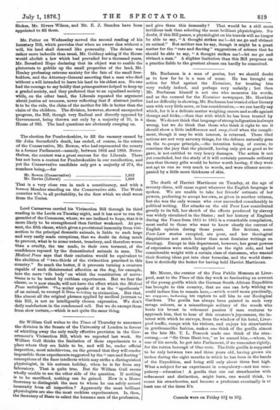Lord Carnarvon carried his Vivisection Bill through its third reading
in the Lords on Tuesday night, and it has now to run the gauntlet of the Commons, where, we are inclined to hope, that it is more likely to be strengthened than further weakened. At pre- rent, the fifth clause, which gives a provisional immunity from vivi- section to the principal domestic animals, is liable to such large and very easily made exceptions, that we doubt its doing much to prevent, what is to some`extent, treachery, and therefore worse than a cruelty, the use made, to their own torment, of the confidence reposed by the -domesticated animals in man. The Medical Press says that their exclusion would be equivalent to the abolition of " two-thirds of the vivisection practised in this country." So much the better, if it prevents turning a creature -capable of such disinterested affection as the dog, for example, into the mere ' vile body' on which the constitution of nerve- tisane is to be tested by ruthless experiments. But we fear the ;clause, it now stands, will not have the effect which the Medical Press antacipatee. The writer speaks of it as the " apotheosis " of an animal, to exempt it froze. ii-vaity to vivisection. But that, like almost all the original phrases applied by medical journals w this Bill, is not an intelligently chosen expression. We don't -deify malefactors in the condemned cell. But we do exempt them from slow torture,—whioh is not quite the same thing.


































 Previous page
Previous page